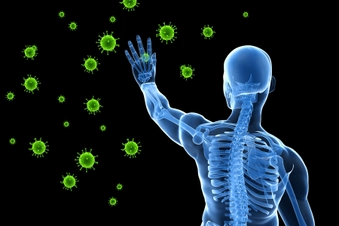Symptoms of Mycobacterium Avium Complex

What Is Mycobacterium Avium Complex (MAC)?
MAC refers to a group of nontuberculous mycobacteria (NTM). These germs are common to dust, water, and soil. They’re harmless to most people who breathe in or swallow them. But your odds of an infection go up if you have a weak immune system because of HIV/AIDS or an underlying lung disease. Some cancers and anything else that weakens your immune system can make you more vulnerable, too. MAC is not contagious, so you can’t catch it from or give it to other people.

Lung Problems
Germs can settle into the small airways and air sacs in your lungs or create a hole in your lung tissue. This is called MAC lung disease. It can lead to chest pain, wheezing, or a cough that doesn’t go away. You might cough up blood or mucus or feel like you can’t catch your breath. About 80% of all NTM infections are pulmonary MAC infections. MAC lung disease typically affects older women or those with another lung condition.

Extreme Fatigue
Any kind of MAC infection can sap your energy. You may feel super tired even with enough sleep. But MAC lung disease can also lead to bronchiectasis. That’s a type of damage to your breathing tubes that doesn’t go away. You may not be able to clear mucus very well. And you may get so exhausted you can’t do normal daily things. Talk to your doctor if this happens to you. Lifestyle changes, breathing treatments, or meds may help.

Stomach Problems and Weight Loss
You could get diarrhea or belly pain. You may feel less hungry or lose weight without trying. Stomach symptoms are common in people with a “disseminated” MAC infection. That means germs have spread throughout your body. You’re more likely to get a disseminated infection if you have a weakened immune system. That’s typically people with advanced AIDS or certain kinds of blood cancer like lymphoma.

Swollen Lymph Nodes
You’ve got hundreds of lymph nodes. These small, bean-shaped bumps carry white blood cells (a type of immune cell) throughout your body. They can swell if your body is fighting off germs. You’ll likely notice MAC-associated swollen lymph nodes in your neck. This is called cervical lymphadenitis. It’s rare in adults. But it’s the most common kind of MAC infection in healthy young kids.

Flu-like Symptoms
MAC infections can seem like other illnesses. That’s because lots of bacteria and viruses can make you feel the same way. For example, your body temperature might go up any time your immune system fights off an infection. With MAC, you might get a high or low fever. And it’s common to get chills and muscle aches at the same time.

Night Sweats
MAC infections and other diseases can make you sweat more than normal at night, especially if you have a fever. You might wake up so drenched that you need to change your clothes.

Anemia
People with a disseminated MAC infection often have a low red blood cell count. You may hear your doctor call this anemia. Ongoing infections or other inflammatory illnesses can make it harder for your body to use iron to make enough red blood cells. But there’s ongoing research into exactly why MAC can trigger anemia.

Skin Problems
MAC can cause different kinds of skin infections. You might get sores on your feet, lower limbs, or other areas. The skin around the lesion might hurt and have a purple or reddish tint. It might turn into an open wound or ulcer. Skin problems are more common in disseminated MAC infections. For some, it might be the first sign of uncontrolled MAC germs.

How Are MAC Infections Diagnosed?
You may need to see an infectious disease doctor. They’ll look at your body and ask how you’re feeling. Based on your symptoms, they may check for MAC in your blood, lymph nodes, bone marrow, or other body fluids. If you have lung issues, you’ll probably get a chest X-ray, CT scan, and a sputum culture. Sputum is the thick mucus in your lungs. Rarely, your doctor may study a piece of your lung tissue under a microscope.

What Are the Treatments for MAC Infections?
It depends on your overall health and how serious your symptoms are. The type of MAC infection you have also matters. It might make sense to monitor your condition before starting treatment. That’s called watchful waiting. But you may need therapy with two or more antibiotics. You’ll likely take these meds for more than 12 months. You might need surgery to cut out infected lung tissue if you don’t get better with antibiotics.

Can You Avoid MAC Infections?
It’s generally not recommended to take antibiotics to stop a MAC infection from happening. But that’s something you should talk to your doctor about. For example, if you have HIV, the best way to stay healthy is with antiretroviral therapy (ART). MAC germs are everywhere, so you can’t avoid them. But a strong immune system can help you fight off an infection.
Show Sources
IMAGES PROVIDED BY:
1) KATERYNA KON / SCIENCE PHOTO LIBRARY / Getty Images
2) SDI Productions / E+ / Getty Images
3) EujarimPhotography / Moment / Getty Images
4) SasinParaksa / iStock / Getty Images
5) 3D4Medical / Science Source
6) HABesen / iStock / Getty Images
7) Jiménez / EyeEm / Getty Images
8) Ed Reschke / Stone / Getty Images
9) Dr P. Marazzi / Science Source
10) EmirMemedovski / E+ / Getty Images
11) Tetra Images / Getty Images
12) SciePro / iStock / Getty Images
SOURCES:
National Organization for Rare Disorders (NORD): “NIH GARD Information: Mycobacterium Avium Complex infections,” “Nontuberculous Mycobacterial Lung Disease.”
Frontiers in Immunology: “The New Frontier of Host-Directed Therapies for Mycobacterium avium complex.”
Cleveland Clinic: “MAC Lung Disease,” “Anemia of Chronic Disease.”
American Lung Association: “MAC Lung Disease.”
UT Health: “Frequently Asked Questions: About “Mycobacterium avium intracellulare complex (MAC).”
Cureus: “Disseminated Mycobacterium avium Intracellulare Infection With Concurrent Small Bowel Obstruction: Case, Pathophysiology, and Clinical Considerations.”
Respiratory Medicine Case Reports: “The chicken and the egg dilemma: A case of disseminated MAC with Hodgkin’s lymphoma.”
Clinical and Vaccine Immunology: “Mycobacterium avium Complex Cervical Lymphadenitis in and Immunocompetent Adult.”
Mayo Clinic: “For Vast Majority, Night Sweats Don’t Represent Medical Concern.”
American Family Physician: “Diagnosing Night Sweats.”